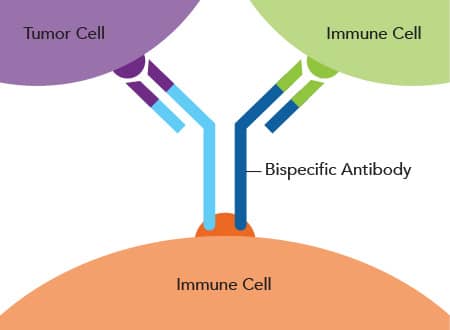Custom Antibody Services Case Study: Existing Antibodies Reinvented into Novel Bispecific Antibodies
The Problem
A pharmaceutical company had been a long-time purchaser of antibodies to important oncology markers. The company was using these antibodies to study cell-to-cell interactions to find potential therapeutic targets. With the recent advancements in immune cell therapy, the company wanted to reinvent their methodology, increasing their chance of success. They needed the specificity of the old antibodies, but with targeting ability of a bispecific affinity reagent.
The Plan
Bispecific antibodies are antibodies that can simultaneously bind to two different antigens or different epitopes on the same antigen. They are widely being used in cancer immunotherapy as they can cross-link tumor and immune effector cells, increasing the proximity of the two cells and activating the immune cell, resulting in the targeted destruction of the tumor cell (Figure 1).

Figure 1. Bispecific antibodies have become promising cancer immunotherapeutics.
The company contacted us for this custom project as there are several challenges with designing and developing bispecific antibodies, all of which are primarily associated with the structural attributes of the molecule. The ideal spatiotemporal context of the bispecific structure should be such that the two variable regions are able to bind to their respective targets with minimal steric hindrance and without significant loss of affinity. At the same time, the structure should also favor high-level expression of the bispecific with minimal co-expression of unassembled fragments, which in turn facilitates an efficient purification process. Our functional bispecific antibodies are derived by achieving conformational stability in combination with retention of specificity for the two intended targets.
Bispecific antibodies can be produced by three different methods: quadromas, chemical conjugation, and genetic recombination. For this project, the client needed the adaptability to quickly switch up the targets of interest. After discussion with our development scientists, the client and R&D Systems agreed that genetic recombination was the best approach for producing their bispecific antibodies.
The Delivery
The hybridoma antibodies that our client was using were first converted to the recombinant form using our platform technology. To ensure bioequivalency, the newly developed recombinant antibodies were compared with their hybridoma version for retention of activity. The client then received a panel consisting multiple structural variations of each bispecific to test in their application. The highest performing reagents were selected for large scale-up. With the bispecific antibodies developed by our custom antibody services team, the client greatly improved their screening methods, allowing them to get ahead of the competition in a very promising market.